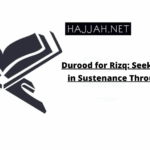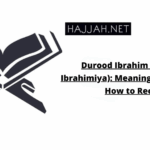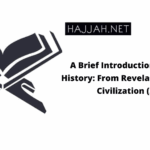For every Muslim, attaining Jannah (Paradise) – the eternal abode of bliss, peace, and closeness to Allah SWT (God) – is the ultimate aspiration and the culmination of a life lived in faith and righteousness. While entry into Jannah is solely by the infinite Mercy of Allah, Islamic teachings provide clear guidance on deeds and practices that are beloved by Him and can pave the way towards this ultimate reward. Among the most profound and accessible of these practices is the act of sending Durood (or Salawat): invoking peace, blessings, honor, and mercy upon Prophet Muhammad (peace and blessings be upon him).
This article explores the deep connection between the consistent and sincere recitation of Durood and the believer’s hope for attaining Jannah.
The Ultimate Goal: Jannah (Paradise) in Islam
Jannah, as described in the Holy Quran and authentic Hadith, is a realm of unimaginable beauty, eternal joy, and complete serenity, free from pain, sorrow, or hardship. It is the ultimate reward for those who believe in Allah, follow His Messengers, and strive to live a life of piety and good deeds. While good deeds are essential, it is crucial to remember that entry into Jannah is fundamentally a gift of Allah’s Rahmah (Mercy).
Also Read
Durood (Salawat) as a Path to Allah’s Pleasure and Mercy
The act of sending Salawat upon Prophet Muhammad (PBUH) is not merely a ritual; it is a direct fulfillment of a divine command and an expression of love and reverence for the final Messenger of Allah.
Allah SWT says in the Quran: “Indeed, Allah confers blessing upon the Prophet, and His angels [ask Him to do so]. O you who have believed, ask [Allah to confer] blessing upon him and ask [Allah to grant him] peace.” (Quran 33:56 – Surah Al-Ahzab)
Fulfilling this command is an act of obedience that is deeply pleasing to Allah, and His pleasure is the key to unlocking His Mercy and, consequently, Jannah.
Key Ways Durood (Salawat) Contributes to Attaining Jannah
The Prophetic traditions (Hadith) illuminate several specific ways in which sending Salawat serves as a means towards achieving Paradise:
-
Receiving Allah’s Blessings, Mercy, and Forgiveness Tenfold: The most frequently cited virtue of Salawat is the multiplied reward from Allah. The Prophet Muhammad (PBUH) said: “Whoever sends blessings upon me once, Allah will send blessings upon him ten times, will erase ten sins from him, and will raise him ten degrees in status.” (Sunan An-Nasa’i – Authenticated by Al-Albani) Allah’s “Salawat” (blessings) upon His servant encompasses His mercy, His praise for that servant among the highest assembly of angels, and the showering of His divine favors. This purification from sins and elevation in spiritual rank directly contributes to one’s worthiness of Jannah.
-
Expiation of Sins: As indicated in the Hadith above, sending Salawat is a potent means for the forgiveness of sins. A lighter scale of sins on the Day of Judgment significantly increases a believer’s hope for entering Paradise. The famous Hadith of Ubayy ibn Ka’b (may Allah be pleased with him) also confirms this, where the Prophet (PBUH) told him that if he dedicated all his supplication time to sending Salawat, his worries would be taken care of and his sins forgiven (Tirmidhi – Graded Hasan).
-
Elevation in Rank (Degrees in Jannah): The promise of being raised “ten degrees in status” by Allah for each Salawat sent is understood by scholars to refer to spiritual elevation in this world and higher stations and degrees within Jannah itself.
-
Attaining the Intercession (Shafa’ah) of Prophet Muhammad (PBUH): This is one of the most significant hopes for a believer on the Day of Judgment. Prophet Muhammad (PBUH) will be granted the unique station of Al-Maqam Al-Mahmood (the Praiseworthy Station) and the ability to intercede on behalf of believers, by Allah’s permission. Frequent recitation of Durood is directly linked to being worthy of this intercession:
- The Prophet (PBUH) said: “The closest of people to me on the Day of Resurrection will be those who sent the most blessings upon me.” (Tirmidhi – Graded Hasan)
- He also said: “My intercession will be for those of my Ummah who committed major sins.” (Abu Dawud, Tirmidhi – Sahih)
- Furthermore, the Du’a recited after the Adhan (Call to Prayer), which often includes or is followed by Salawat, contains a plea for the Prophet (PBUH) to be granted Al-Wasilah and Al-Fadilah, and the Prophet (PBUH) stated that his intercession would be permissible for whoever makes this Du’a (Sahih al-Bukhari). The intercession of the Prophet (PBUH) is a powerful means through which believers hope to enter Jannah.
-
A Sign of True Love and Adherence to the Prophet (PBUH): Sending abundant Salawat is a manifestation of sincere love, respect, and adherence to the teachings of Prophet Muhammad (PBUH). Such love and اتباع (following) are fundamental aspects of strong Iman (faith), and strong faith is the primary prerequisite for attaining Jannah.
-
A Means for Du’as to Be Accepted: Including Salawat at the beginning and end of one’s personal supplications is a recommended etiquette that increases the likelihood of those Du’as being accepted by Allah. A Du’a for Jannah, framed by Salawat, thus holds greater promise.
Making Durood a Consistent Practice for a Blessed Hereafter
To harness the virtues of Durood for attaining Jannah, consider the following:
- Sincerity (Ikhlas): Send Salawat purely for the sake of Allah and out of genuine love for His Messenger (PBUH).
- Frequency and Consistency: Make it a regular and abundant practice throughout the day, not just an occasional act.
- Understanding and Reflection: Ponder the meaning of Salawat and the high status of the Prophet Muhammad (PBUH).
- Utilize Authentic Forms: While many forms exist, Durood Ibrahim (recited in the Tashahhud of Salah) is considered the most complete. Simple forms like “Sallallahu ‘alayhi wa sallam” are also highly meritorious.
- Holistic Practice: Remember that Durood is one powerful act among many within the comprehensive framework of Islam. It should be coupled with fulfilling all other obligations (Salah, Zakat, Sawm, Hajj if able), good deeds, and avoiding prohibitions.
Conclusion
While entry into Jannah is ultimately a manifestation of Allah’s infinite mercy, the act of sending Durood (Salawat) upon Prophet Muhammad (peace and blessings be upon him) is a profoundly virtuous deed that is strongly associated with pathways leading to Paradise. It is a means by which believers receive Allah’s multiplied blessings and mercy, gain forgiveness for their sins, are elevated in spiritual rank, and, significantly, increase their hope of attaining the cherished intercession of the Prophet (PBUH) on the Day of Judgment.
By making abundant, sincere, and mindful recitation of Durood a cornerstone of their devotional life, Muslims cultivate their love for the Prophet (PBUH), fulfill a divine command, and earnestly seek the pleasure of Allah, which is the ultimate key to the eternal bliss of Jannah.








